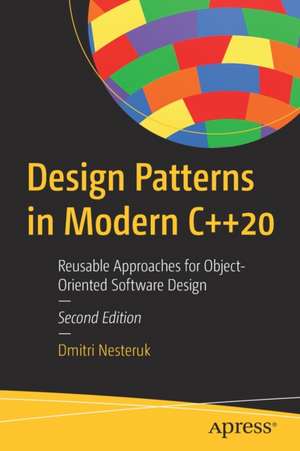Design Patterns in Modern C++20: Reusable Approaches for Object-Oriented Software Design
Autor Dmitri Nesteruken Limba Engleză Paperback – 6 noi 2021
Design Patterns in Modern C++20, Second Edition also provides a technology demo for modern C++, showcasing how some of its latest features (e.g., coroutines, modules and more) make difficult problems a lot easier to solve. The examples in this book are all suitable for putting into production, with only a few simplifications made in order to aid readability.
What You Will Learn
- Use creational patterns such as builder, factories, prototype and singleton
- Implement structural patterns such as adapter, bridge, decorator, facade and more
- Work with the behavioral patterns such as chain of responsibility, command, iterator, mediator and more
- Apply functional design patterns such as the Maybe Monad
This book is for both beginner and experienced C++ developers.
Preț: 220.86 lei
Preț vechi: 276.07 lei
-20% Nou
Puncte Express: 331
Preț estimativ în valută:
42.26€ • 44.24$ • 34.97£
42.26€ • 44.24$ • 34.97£
Carte disponibilă
Livrare economică 15-29 martie
Preluare comenzi: 021 569.72.76
Specificații
ISBN-13: 9781484272947
ISBN-10: 1484272943
Pagini: 345
Ilustrații: XIV, 386 p. 11 illus.
Dimensiuni: 155 x 235 x 28 mm
Greutate: 0.56 kg
Ediția:2nd ed.
Editura: Apress
Colecția Apress
Locul publicării:Berkeley, CA, United States
ISBN-10: 1484272943
Pagini: 345
Ilustrații: XIV, 386 p. 11 illus.
Dimensiuni: 155 x 235 x 28 mm
Greutate: 0.56 kg
Ediția:2nd ed.
Editura: Apress
Colecția Apress
Locul publicării:Berkeley, CA, United States
Cuprins
1. Introduction.- Pt I Creational Patterns.- 2. Builder.- 3. Factories.- 4. Prototype.- 5. Singleton.- Pt II Structural Patterns.- 6. Adapter.- 7. Bridge.- 8. Composite.- 9. Decorator.- 10. Façade.- 11. Flyweight.- 12. Proxy.- Pt III Behavioral Patterns.- 13. Chain of Responsibility.- 14. Command.- 15. Interpreter.- 16. Iterator.- 17. Mediator.- 18. Memento.- 19. Null Object.- 20. Observer.- 21. State.- 22. Strategy.- 23. Template Method.- 24. Visitor.
Notă biografică
Dmitri Nesteruk is a quantitative analyst, developer, course and book author, and an occasional conference speaker. His interests lie in software development and integration practices in the areas of computation, quantitative finance and algorithmic trading. His technological interests include C# and C++ programming as well high-performance computing using technologies such as CUDA and FPGAs. He has been a C# MVP since 2009.
Textul de pe ultima copertă
Apply the latest editions of the C++ standard to the implementation of design patterns. As well as covering traditional design patterns, this book fleshes out new design patterns and approaches that will be useful to modern C++ developers. Author Dmitri Nesteruk presents concepts as a fun investigation of how problems can be solved in different ways, along the way using varying degrees of technical sophistication and explaining different sorts of trade-offs.
Design Patterns in Modern C++20, Second Edition also provides a technology demo for modern C++, showcasing how some of its latest features (e.g., coroutines, modules and more) make difficult problems a lot easier to solve. The examples in this book are all suitable for putting into production, with only a few simplifications made in order to aid readability.
You will:
Design Patterns in Modern C++20, Second Edition also provides a technology demo for modern C++, showcasing how some of its latest features (e.g., coroutines, modules and more) make difficult problems a lot easier to solve. The examples in this book are all suitable for putting into production, with only a few simplifications made in order to aid readability.
You will:
- Use creational patterns such as builder, factories, prototype and singleton
- Implement structural patternssuch as adapter, bridge, decorator, facade and more
- Work with the behavioral patterns such as chain of responsibility, command, iterator, mediator and more
- Apply functional design patterns such as the Maybe Monad
Caracteristici
Apply design patterns to modern C++20 programming as well as classic design patterns Learn behavioral patterns such as chain of responsibility, command, and iterator Use structural patterns such as adapter, bridge, and decorator


